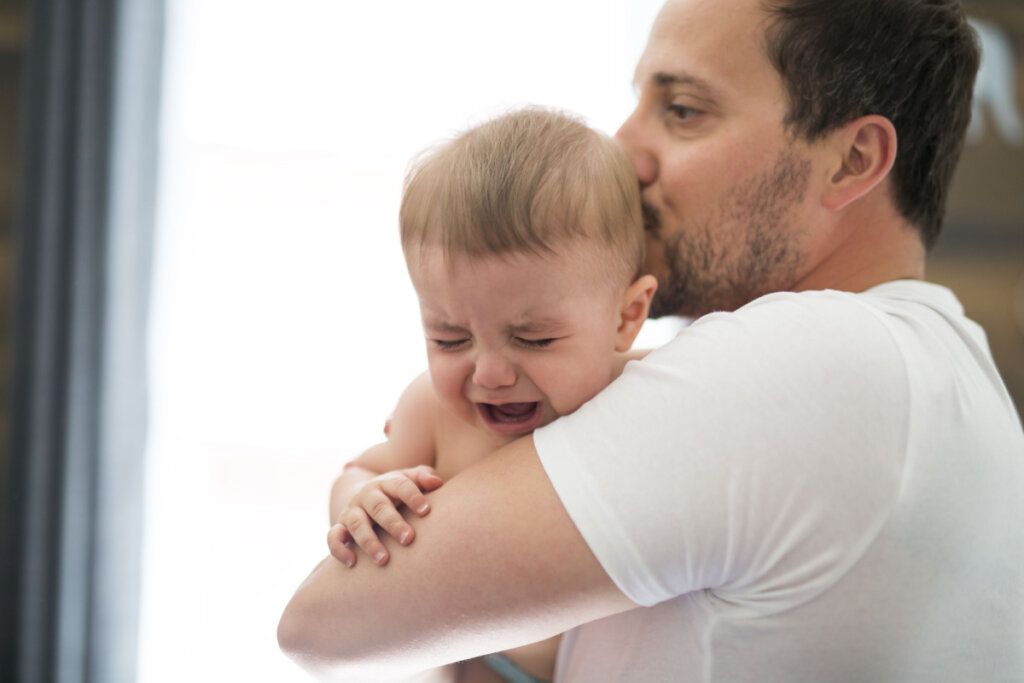How do Babies Know Who to Trust?


Written and verified by the psychologist Valeria Sabater
For babies, the world is an exciting place. In fact, for them, everything is new. Their budding minds peer into the world via their fascinating and ever-changing brains. At birth, they possess about 100 billion neurons, almost the same as the number of stars in the Milky Way.
However, as fascinating as their brains are, their behavior and the way in which they understand how the environment around them works are even more so. We know that their parents are the essential attachment figures with whom they will establish knowledge and skills. Indeed, their parents are their reference points. But, this doesn’t prevent them from being curious about what lies beyond their own little world.
Science has long been interested in understanding how younger children judge how trustworthy others are. Anyone who has a baby knows that there are two types. There are those who smile at everyone and want to touch everyone. On the other hand, there are others who cry at the approach of any stranger.
So, what makes them, at any given moment, offer their trust to someone? Science has the answer and it’s rather surprising.
Young children need to understand really early which figures are reliable so they’re taken care of. It’s a basic survival mechanism.

How babies know who they can trust
Children become natural signal decipherers very early. Moreover, they do it much sooner than we might think. As a matter of fact, prior to speaking, they already understand many more things than they can express. One of their first needs is to know that they’re safe and that the people around them are trustworthy and non-threatening figures.
Such reasoning appears too sophisticated for a baby of eight or ten months. Yet, the earliest cognitive mechanisms that a child will carry out will be for this purpose. Science has spent years trying to understand how babies know who they can trust. Now, thanks to a recent investigation, this mystery has been solved.
The Massachusetts Institute of Technology (USA) conducted a study that claimed infants infer the quality of relationships between people extremely early on via a specific element.
Babies need constant physical contact from their caregivers. Kisses are comforting gestures that they get used to early on. They allow them to build a bond of trust with these figures.
1. The saliva exchange: will you share this ice cream with me?
The exchange of saliva is the most decisive signal that a baby will use to know if a figure is reliable. They also use it to detect if two people have a close relationship. This is hardly surprising. After all, none of us share our saliva with others lightly.
Infants pay attention to all situations related to food. For instance, they often want to try what’s on our plates. Moreover, it’s often fun for us to share our ice creams or give them little pieces of cake, sandwich, or pizza, whatever it is, in fact, that we’re eating.
Whatever a child puts in their mouth is extremely stimulating for them. And, when they share food with their parents, it creates bonds of trust.
2. Kisses that transmit love (and saliva)
When we establish close, affectionate, and solid relationships, we exchange actions that involve saliva, like kissing. This is another way that babies know who to trust. People in their daily lives not only hold them in their arms or caress them, but they also give them kisses. These are gratifying gestures that they enjoy and come to understand really early on.
Moreover, between eight and twelve months, babies start to feel interested in the interactions around them. They understand that there’s affection between their parents because they share kisses and exchange saliva. But, why don’t children like being kissed by strangers?
As a matter of fact, kisses are invasive. Therefore, although babies understand them as factors that mediate the construction of trustworthy relationships, for trust to appear, something else must happen first. This is the sharing of food. Indeed, if we want to win a child’s affection, we must share our food with them. Then, the kisses will come.
Young children pay close attention to the non-verbal language of adults. They know that kisses only occur between figures who share a close bond.
3. Kisses appease fears and anguish
The way in which babies learn who to trust also forms part of another experience. Children frequently experience anxiety. They fear a lack of comfort, loneliness, not being fed or protected, the emptiness of the dark at night, or having no physical contact.
Kisses act to alleviate their fears and feelings of anguish. They comfort them and make them feel safe. When they feel terrified, a simple kiss reduces their stress. Kissing is like a caress with saliva. It releases large doses of endorphins which strengthens bonds. This is something that little ones discover within a few weeks of life.

Conclusion
Babies are vulnerable but extraordinarily powerful creatures. They’re nourished by love and affection. Indeed, it’s from this position that they securely discover the world, satisfying their boundless curiosity. They’re small learning machines, readers of social gestures and subtle signals that go unnoticed by us. For them, they’re beacons of discovery.
Their brains are highly complex neural networks that are constantly changing. They operate via really basic, instinctive, and almost atavistic interactions. Physical contact and the feeling of safety and security are everything.
You might find it surprising that saliva is an element that increases confidence. However, when you think about the situations in which they’re usually exchanged, it shouldn’t really be a surprise at all. After all, food and kisses are the scaffolding in human relationships. Babies are aware of this fact, so let’s ensure we provide them with these most rewarding experiences.
All cited sources were thoroughly reviewed by our team to ensure their quality, reliability, currency, and validity. The bibliography of this article was considered reliable and of academic or scientific accuracy.
- L. A. Hirschfeld, On a Folk Theory of Society: Children, Evolution, and Mental Representations of Social Groups. Pers. Soc. Psychol. Rev. 5, 107–117 (2001).
- L. Thomsen, S. Carey, in Navigating the Social World: What Infants, Children, and Other Species Can Teach Us (Oxford Univ. Press, 2013), p. 17.
- Thomas AJ, Woo B, Nettle D, Spelke E, Saxe R. Early concepts of intimacy: Young humans use saliva sharing to infer close relationships. Science. 2022 Jan 21;375(6578):311-315. doi: 10.1126/science.abh1054. Epub 2022 Jan 20. PMID: 35050656.
This text is provided for informational purposes only and does not replace consultation with a professional. If in doubt, consult your specialist.








